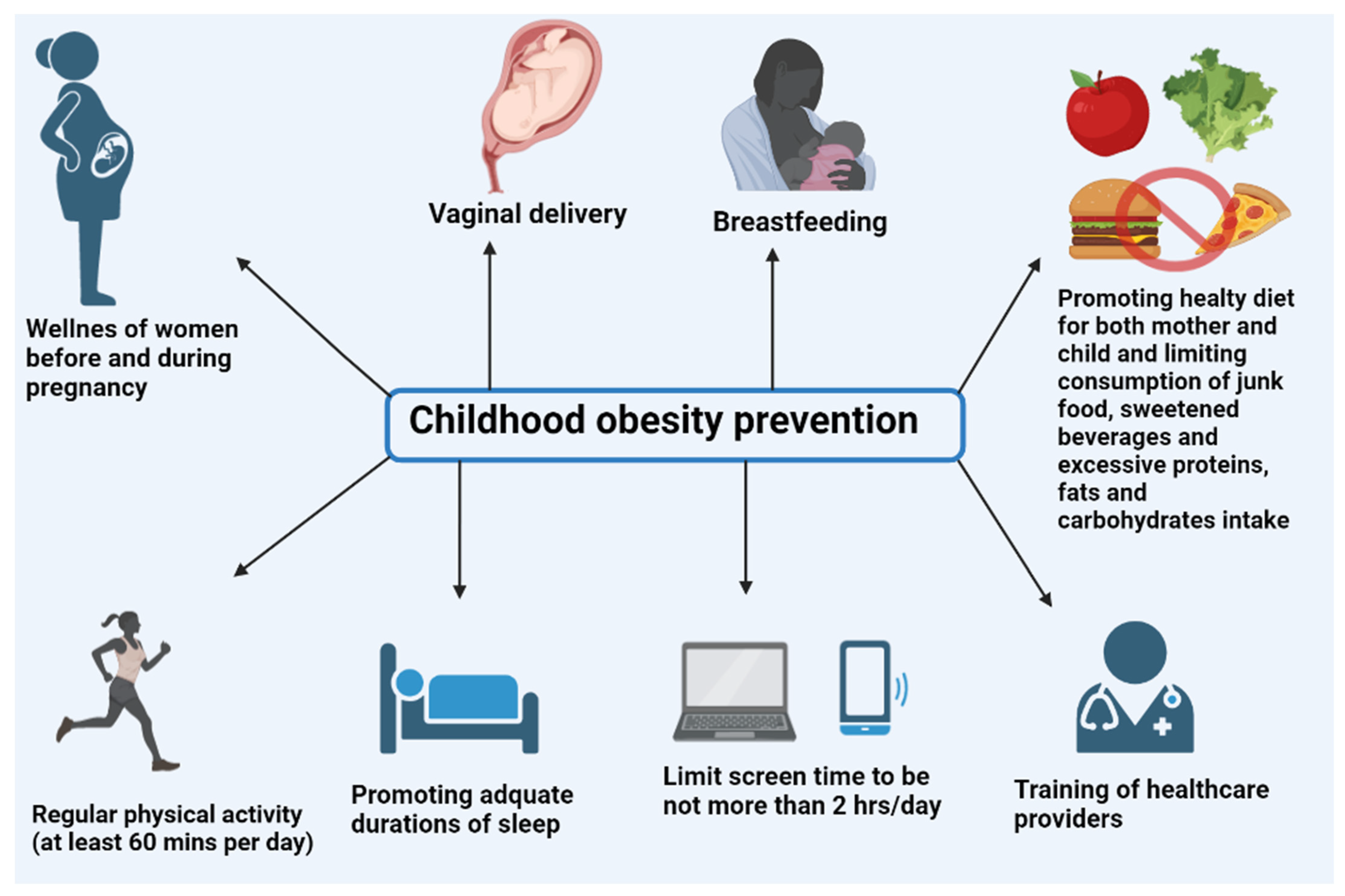Prevent Childhood Obesity
Prevent Childhood Obesity: Tips for Healthy Habits & Active Lifestyles. Learn how to Prevent Childhood Obesity with easy tips for healthy eating & active play. Help your kids build lifelong habits for a brighter future!

Importance of Preventing Childhood Obesity
Prevent Childhood Obesity because the foundation of a healthy lifestyle is established during youth. The rising prevalence of obesity in children is alarming, with significant long-term impacts on physical, emotional, & social well-being. Obesity can lead to various health issues such as diabetes, heart disease, & mental health challenges like anxiety & depression. And don’t forget, children with obesity often face social stigmas, leading to bullying & reduced self-esteem.
Parents, caregivers, & educators must recognize the critical role they play in shaping a child’s lifestyle. Advocating for healthy habits not only protects children but also sets them up for lifelong wellness & resilience against diet-related illnesses. When communities rally together to promote healthy eating & active living, the odds of fostering a healthier generation increase markedly.
Encouraging Balanced Nutrition at Home
To Prevent Childhood Obesity, the first step is to cultivate balanced nutrition habits within the home. This means making healthier food choices readily available & teaching children about the benefits of nutritious foods. One effective strategy is involving children in meal planning & preparation. This participation can spark interest in healthy eating & make children more willing to try new foods. And another thing, maintaining a stocked pantry with wholesome snacks, such as fruits, vegetables, nuts, & whole grains, is crucial. Regular family meals can also promote healthier eating patterns, allowing caregivers to model proper portion sizes & encourage mindful eating habits.
- Include a variety of fruits & vegetables in family meals.
- Avoid sugary drinks and stay hydrated with water or milk.
- Teach children to read nutrition labels to make informed choices.
- Encourage trying new recipes & cuisines to discover healthy options.
Limit Screen Time & Encourage Outdoor Play
Limiting screen time is essential in the effort to Prevent Childhood Obesity. Excessive screen time contributes to sedentary behavior & often leads to unhealthy snacking. Setting boundaries on daily screen time can encourage children to engage in more active pursuits. Alongside reducing screen usage, promoting outdoor play & physical activity is necessary. Designating specific times for physical activities, such as playing sports, riding bikes, or simply walking in a park, can create excitement around being active. Schools & communities can also create organized activities to foster a love for movement.
| Activity Ideas | Benefits |
|---|---|
| Sports Teams | Enhance teamwork & physical skills. |
| Family Hikes | Bonding time while enjoying nature. |
| Dancing | Improves coordination & is fun! |
Modeling Healthy Behaviors as Caregivers
To effectively Prevent Childhood Obesity, caregivers must model healthy behaviors. Kids tend to copy the behaviors they see in adults. This includes dietary choices, physical activity levels, & attitudes towards health. By demonstrating a commitment to a balanced lifestyle, caregivers can influence children significantly. Engaging in family exercise sessions, cooking healthy meals together, or reading nutrition labels as a family can reinforce healthy habits conversationally & practically. Sharing experiences of making healthier choices & discussing the importance of well-being can further inspire children to adopt those habits themselves.
- Share personal fitness goals & outcomes with children.
- Encourage a family activity night where everyone participates.
- Discuss the health benefits of regular exercise & nutritious meals.
Incorporating Physical Activity into Daily Routines
Integrating physical activity into daily routines is paramount to preventing childhood Obesity. By incorporating movement into regular activities, children learn that being active can be enjoyable & effortless. This can be as simple as choosing to walk or bike to school instead of driving. Ensuring children have the opportunity for movement during playtime at school or in the neighborhood can significantly contribute to their overall activity level. Establishing a routine that includes short intervals of activity, such as stretching or quick exercises during breaks, can also keep the body engaged & energized.
| Time Slot | Suggested Activity |
|---|---|
| Morning | Wake up with stretches or yoga. |
| Afternoon | Active play with friends or sports. |
| Evening | Family walks or sports games. |
Creating a Supportive Environment for Healthy Growth
To effectively Prevent Childhood Obesity, creating supportive environments is critical. This can include both home & community settings that encourage & facilitate healthy decisions. Homes should be structured to be conducive to physical activity by keeping active toys accessible & designating spaces for play & exercise. Community resources such as parks, recreational centers, & sports teams should be promoted to provide children with ample opportunities for physical activities.
Schools also have a vital role in creating a supportive environment by offering nutritious meals in cafeterias, facilitating physical education classes, & ensuring a safe space for outdoor activities.
- Encourage participation in community sports leagues.
- Take advantage of local parks for family outings.
- Advocate for healthier food options in schools.
Instilling Mindful Eating Practices
Mindful eating practices are essential in the effort to Prevent Childhood Obesity. Teaching children to pay attention to their hunger cues helps them develop a better relationship with food. This can include encouraging children to eat slowly, without distractions, & listen to their bodies. Mindful eating allows children to distinguish between hunger & boredom and emotional eating. Practicing portion control & encouraging variety during meals also plays a crucial role.
Caregivers can lead this practice by serving appropriate portions & discussing the importance of not rushing meals, further reinforcing the principle of enjoying food rather than consuming it mindlessly.
| Mindful Eating Tips | Description |
|---|---|
| Slow Down | Eating slowly allows time to feel full. |
| Eliminate Distractions | Focus on meals without screens. |
| Portion Control | Teach children about appropriate serving sizes. |
Community Engagement & Resources
Community plays a vital role in the initiative to Prevent Childhood Obesity. Collective efforts can lead to better access to resources & support for healthy lifestyles. Community centers can host family fitness days, nutrition workshops, or cooking classes. Collaborating with local businesses to provide healthy options in school vending machines or sponsoring sports teams also contributes positively. And another thing, communities can advocate for better urban planning that encourages safe environments for physical activity, such as developing walking trails, sports fields, & playgrounds. All these efforts help create a culture of health that can significantly impact children’s behavior.
- Participate in community health fairs.
- Join or form walking groups in your neighborhood.
- Support local farms or markets for fresh produce.
“By focusing on health & fitness, we can dramatically change the trajectory of the next generation & Prevent Childhood Obesity.” – Marcelle Swift
Educating Children on Health & Nutrition
Education is a cornerstone in the effort to Prevent Childhood Obesity. Helping children understand the value of good nutrition and exercise can guide them toward healthier decisions
. This education can begin at home, where caregivers can discuss the benefits of fruits, vegetables, & whole grains compared to processed foods. Schools can implement health classes that cover topics such as nutrition labels, caloric intake, & food groups. Incorporating hands-on activities, such as gardening or cooking classes, can make learning about healthy eating fun & interactive. By providing children with knowledge, we enable them to take charge of their health.
| Education Topics | Example Activities |
|---|---|
| Nutritional Value of Foods | Compare different snacks during class. |
| Understanding Food Labels | Work on finding healthy options in local stores. |
| Benefits of Staying Active | Design a “movement calendar” at school. |

What are some tips for preventing childhood obesity?
To prevent childhood obesity, encourage healthy eating habits by providing nutritious foods, limit sugary drinks & snacks, promote regular physical activity, set a good example with your own lifestyle choices, & create a supportive environment that fosters healthy behaviors.
How can parents encourage healthy habits in children?
Parents can encourage healthy habits by involving children in meal planning & preparation, making physical activities fun & accessible, setting consistent meal & snack times, & promoting limits on screen time to encourage more active play.
What role does physical activity play in preventing obesity?
Physical activity is crucial in preventing obesity as it helps burn calories, builds muscle, & promotes overall health. Regular exercise keeps metabolism high & is vital for maintaining a healthy weight.
How important is nutrition in preventing childhood obesity?
Nutrition is extremely important in preventing childhood obesity. A balanced diet rich in fruits, vegetables, whole grains, & lean proteins, while limiting processed foods, helps children develop healthy eating patterns that can last a lifetime.
How can you make meals for kids healthier with minimal effort?
To make meals healthier for kids, try incorporating more fruits & vegetables, whole grains, & lean proteins. You can also get creative with food presentation, involve kids in cooking, & substitute healthier ingredients in their favorite dishes.
How can schools contribute to preventing childhood obesity?
Schools can contribute by offering healthy meal options, providing nutrition education, promoting physical activity during & after school hours, & creating an environment that encourages healthy eating & exercise among students.
What is the impact of screen time on childhood obesity?
Excessive screen time is linked to childhood obesity as it often leads to a sedentary lifestyle, reduces the time available for physical activity, & can encourage snacking on unhealthy foods. Setting limits on screen time can help mitigate these effects.
Are there community programs to help prevent childhood obesity?
Yes, many communities offer programs aimed at preventing childhood obesity, including after-school sports, cooking classes, family fitness events, & wellness initiatives that promote healthy living & active lifestyles for children & families.
What can be done to get kids moving more?
To get kids moving more, parents can engage them in fun physical activities, such as dancing, biking, swimming, or playing sports. And another thing, encouraging outdoor play & limiting screen time can help increase overall activity levels.
Why is it important to establish healthy habits early in life?
Establishing healthy habits early in life is important because childhood is a critical time for growth & development. Early healthy behaviors can lead to a lower risk of obesity, better physical health, & improved emotional well-being as children grow into adulthood.

Publisher: domf5oio6qrcr.cloudfront.net
Conclusion
To effectively Prevent Childhood Obesity, it’s important to embrace healthy habits & an active lifestyle. Parents & caregivers play a vital role by encouraging nutritious eating & regular physical activity. Simple changes, like cooking together or playing outside, can make a big difference. Remember, it’s not just about weight, but instilling lifelong habits. By fostering a supportive environment & being positive role models, we can help children make smart choices. Let’s work together to Prevent Childhood Obesity & give our kids the chance to grow happy & healthy. Every little step counts!